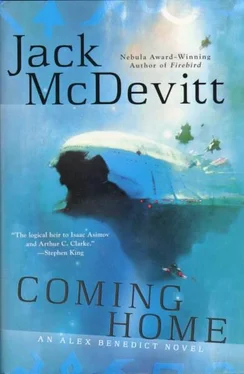—Marianne Coxley,
On the Road, 2044 C.E.
We caught a maglev into Chantilly. The last ten minutes of the ride took us along the lakeshore. We saw piers and boats and a few people fishing. And then, without warning, the Washington Monument rising from the water. It was supposed to be taller than the original one although there was no way to be sure. But reconstructing it constituted the ultimate act of defiance by the American people against the rising seas that were engulfing them and the rest of the world.
The cupola and dome of the old Capitol building had at one time also risen above the lake waters. But they were deemed to suggest a broken nation. They detracted from the grandeur expressed by the obelisk, so they were taken down.
I knew, of course, what the Golden Age capital had looked like in its halcyon era. When we’d visited Atlantis in the tour sub a few years earlier, there’d been no emotional reaction to the submerged ruins because there was no record of Atlantis in its prime. But this was different. Riding along that lakefront, I wondered what visitors to Andiquar, arriving in ten or eleven thousand years, would see? You wander around near Independence Park and the Hall of the People, and you get a sense that they will be there forever. But forever is a long time. The people who lived in Washington before the waters came probably thought that about their city. But it’s all temporary, baby. Perpetuity is an illusion.
The planet was no longer a place Neil Armstrong would have recognized. Most of the historic Golden Age cities had been located on or near water. Consequently, they were for the most part gone. Paris and Rome remained. And Madrid and Tehran. A few others.
The international borders were gone as well. They’d dissolved during the Fourth Millennium, and with them the nation-states they’d defined. All prior attempts to form a world body had ultimately failed, resulting in international disruptions, until the rise of the World Union at the beginning of the Fifth Millennium. The much-feared global government had finally appeared, but it turned out to be, at worst, no more inefficient or corrupt than the governments that had preceded it. Its major contribution, during those early centuries, had been that it kept the peace. Gradually, when the turmoil subsided, and the Dark Age had passed, a quiet and efficient civilization emerged. On Earth, everyone lived, effectively, in a county or its equivalent. It may have been that a fair level of tranquillity finally arrived because people had decent lives. Controls were in place to keep power-grabbing loons at a distance. Professional politicians no longer existed. And maybe, as Ingmar Moseka commented, liberal education was available to all, and the result was a responsible population that wasn’t as easy to fool as it had been in earlier times. Laws were made and policies developed by citizens who served a limited term, then returned to their lives. And people were free to live as they wished, without having to worry about where their next meal was coming from.
Advanced technology made food and housing available for all. AIs and robots did most of the work that no one else wanted to be bothered with. Most people managed careers, some simply lived lives of leisure. And humanity’s movement to the stars, which had begun in the twenty-sixth century, accelerated. The half dozen worlds we occupied at the beginning of the Dark Age blossomed, a thousand years later, into a vast network.
People lived at leisure everywhere if they so desired. Even on the home world, it wasn’t necessary to work if one wasn’t inclined. Education was available for all, as was opportunity, and in the end, success was defined primarily by one’s contribution to the community. Major achievements, scientific, literary, artistic, began to come in from distant worlds.
The people of Earth, however, never forgot who they were. They were never quite ready to accept equality with those whom they still thought of as colonials. Despite that, throughout the several hundred worlds of the Confederacy, the human race gradually evolved into a family.
Well, at least we’d gotten closer than ever before.
* * *
Les Fremont was still active with the North American Archeological Institute. He’d written two books on what he called expeditions into time, and he still participated in fieldwork. We arrived shortly after noon at a modest chateau located in a neighborhood filled with oaks and hedges. Kids tossed balls around at a corner playground. Fremont’s home had a small lawn, surrounded by a plastene fence. A swing hung from a tree limb.
The cab pulled into the driveway, and Fremont came out the front door. He was a large, elderly man who walked with a limp. He waved as we got out of the cab and moved carefully down the steps leading off his deck. “Alex?” he asked.
Alex waved back. “Hello, Dr. Fremont.” He looked around. “Beautiful place.”
“Thank you. My name’s Les, by the way.”
They both turned toward me. “My colleague, Chase Kolpath.”
“Pleasure to meet you, Chase.” Fremont extended a hand and led us inside. “Hot out there.” It was.
We sat down in the living room, and he asked what we’d like to drink. “We only have wine and fruit juice,” he said. “I’m sorry. I just didn’t think of it. I tend to overlook stuff now.”
He offered no further explanation. But he glanced at a woman’s framed photo. We all went for the wine.
He brought it out and settled into a large chair that might have been custom-made for him. We raised our glasses to Garnett Baylee, “who was,” according to Fremont, “one of a kind.” Then he folded his hands. “Alex, how may I be of assistance?”
Alex explained about the Corbett.
Fremont almost went into shock. “Really? Are you sure? He found a Corbett transmitter and didn’t tell anybody? Is that what you’re saying?”
“That’s correct, Les.”
“Why?”
“That’s why we’re here. We’re hoping to get an answer.”
“When you do, I’d like to hear what it is.”
“Did you have much contact with him when he lived here?”
“I saw him pretty often. Garnie and I were friends. And we were both interested in Golden Age archeology. Although, if you want the truth, I think he was a little over-the-top.”
“That’s pretty much what we’ve heard generally.”
“The thing he really cared about was the Huntsville museum artifacts. He spent a lifetime trying to figure out what happened to them.”
“And what did he conclude?”
“I don’t know if he ever did reach a conclusion. The last time I saw him, which was a year or so before he left us, he was still on the hunt. You know he lived near here, right?”
“No. I wasn’t aware of that. Do you have the address?”
“Let me write it down for you.” He reached for a pad, wrote on it, and handed the sheet to me. He’d have had to get up to pass it to Alex.
Alex looked at it. “Thanks,” he said. “He lived nearby, but you lost contact with him for a year ?”
“He just wasn’t around much.”
“Okay. By the way, Les, the Corbett transmitter Baylee’s son-in-law found in his closet was on the Huntsville museum inventory.”
“Why did I think you were going to say that? Is that really true?”
“Yes.”
“That’s hard to believe, Alex. If he’d found something like that, he would have told me. There’s no way he’d have kept it to himself.”
“Can you recall anything specific? Did he ever express any theory about where he thought the artifacts might be?”
“Well, he entertained different theories at different times. But none of them ever worked out. He was still wandering around trying to get an answer when I lost touch with him. So I don’t know where he was looking during his last year or two here. He might even have backed off. He did that periodically. He’d join a mission to the Middle East, or Germany or somewhere. I was always glad to hear about that, that he was doing something else, because the whole thing seemed hopeless. I mean, we’re talking about ancient history. What kind of condition was the transmitter in?”
Читать дальше












